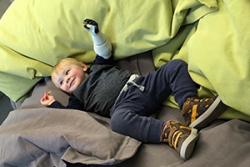Pontio Innovation supports Bangor University alumnus to develop prosthetic for his son
 Ben Ryan: Photo: AmbionicsA Bangor University alumnus has set up his own company to develop prosthetics for young children with support from Pontio Innovation.
Ben Ryan: Photo: AmbionicsA Bangor University alumnus has set up his own company to develop prosthetics for young children with support from Pontio Innovation.
Two years ago, Sol Ryan, son of psychology alumnus Ben Ryan, needed emergency surgery at just 10 days old. Surgeons made the devastating decision to amputate Sol's left arm just below the elbow because of a blood clot.
Health professionals would not offer help with prosthetic arms until Sol was a year old.
Ben did not want to wait a year, so he used rolled-up pieces of foam taped to Sol's elbow to see what would happen. Within minutes, Sol was banging his toys with his hand - and his foam arm. It was the first time he had tried to use the left arm since the amputation, before that, the left arm didn't do anything.
It was the breakthrough moment for Ben. From there, developing a better prosthetic arm for young Sol became an obsession. Ben came up with an idea for a new design that would operate a hand using tiny movements of the elbow.
Convinced it would work, Ben contacted Pontio Innovation and asked them for help.
Wyn Griffith, chief technician for Pontio Innovation, recalls: "When I started to talk to Ben and found out what he wanted to do and why he wanted to come here, I was quite humbled really.
"We'd just moved into this building - what better way to put this new equipment to use than to actually help Ben with his project."
Using state-of-the-art 3D printing technology at the innovation lab, Ben and the University staff were able to turn a mish-mash of DIY store parts and imagination into something much more.
Wyn continued: "The best way we can help people, is to help them help. We've given Ben the skills and access to the equipment and training so he can actually develop his own ideas."
Today, Sol has a new prototype of an arm and hand that can grip, with a moveable thumb. And instead of the three months it takes to cast and build a fibreglass prosthetic through the health service, a new arm can be built and printed from scratch in a matter of days.
It means not only is the young boy getting the early intervention his family are convinced he needs, it has opened up a whole new world of opportunities for his father.
Dr Andy Goodman, Director of Innovation at Pontio, said: “This could cut NHS waiting times from 6-12 weeks to a few hours. This is particularly important considering the developmental psychology implications, and its impact on the life of individuals can't be understated.
“In due course, developments could include printed sensors, and software development to automate fitting and manufacture within the home. A multidisciplinary approach would ideally include engineering, health service systems, computer science, psychology, health economics, business and product design.”
Ben has given up his day job to concentrate full-time on prosthetics, setting up a new company called Ambionics. Despite being a fledgling start-up, Ben has already won some big name backing. Along with Bangor University's Pontio centre, Ambionics is also being supported by the Life Sciences Hub Wales and its entrepreneurship programme.
So far, the whole project has been funded by family and friends, but a crowd funding campaign has now began as Ben wants to raise at least £150,000 to satisfy medical authorities his arm prosthetics are safe to use, finalise patents, and to develop the design.
If Ben can raise even more, he wants to see medical research trials to back up his own theories on how young children learn to use artificial limbs.
Crowdfunding details can be found here.
The BBC’s news story and video about this exciting development can be seen here: BBC News
Publication date: 6 March 2017
